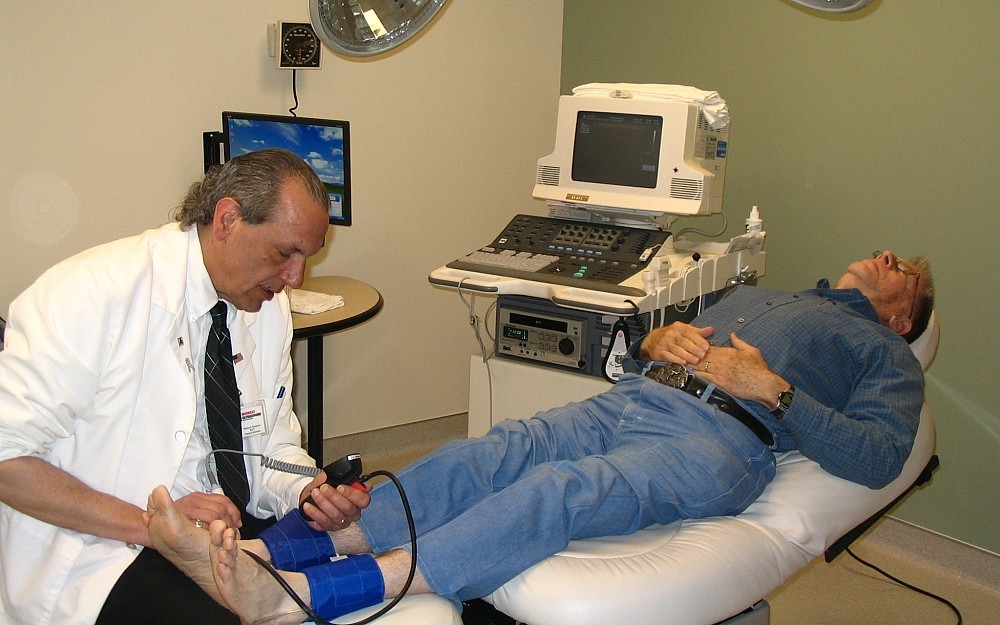
UC HEALTH LINE: Free Vascular Screenings Available at UC Heart and Vascular Center
CincinnatiFailing to pay attention to your vascular health could lead to potentially life-threatening conditions, including silent blood clots that travel through the bloodstream into the heart or lungs.
If youre over 60, says Amy Reed, MD, making time for three simple vascular screening tests could save your life.
Most people dont understand how their vascular health can affect the body, explains Reed, a vascular surgeon and assistant professor of surgery with the University of Cincinnati (UC). People understand the risks associated with blockages in heart vessels, but the reality is that blockages in the vessels leading to your brain and legs can be just as harmful.
The human vascular system is a complex arrangement of vessels that carry blood to specific parts of the body. Arteries, which carry oxygen-rich blood away from the heart, distribute blood throughout the body. Veins, smaller vessels, return blood to the heart.
Vascular problems occur when fat and cholesterol (plaque) build up on the artery walls. As plaque increases, the arteries harden and become narrow. Gradually, blood flow decreases and parts of the body are deprived of the oxygen they need to function properly.
People need to take steps to improve their vascular health and get screening tests when its appropriate, adds Reed. Detecting vascular disease early can help prevent serious problemslike stroke or crippling leg painin the future.
Reed says three of the most common non-cardiac vascular diseasesabdominal aortic aneurysms, carotid artery disease and peripheral arterial diseasecan be detected through screening tests and then treated with minimally invasive surgery techniques.
The UC Heart and Vascular Center is offering free vascular screening tests on Friday, Sept. 28, for men and women over 60 and people deemed at elevated risk for vascular disease.
The tests, which combined take about 15 minutes, include a carotid artery ultrasound to detect blockages in the vessels that feed blood to the brain, an abdominal aorta ultrasound to identify aneurysms or bulges that indicate vessel weakness, and an ankle blood pressure test to detect blockages in the legs.
All the tests are noninvasive, so youll experience no pain or discomfort, adds Dr. Reed. But youll leave armed with information about your vascular health.
Reeds notes that a persons risk for vascular disease is influenced by family history and it increases with age. Also at elevated risk are diabetics and people who are obese, have high blood pressure or high cholesterol, or have ever smoked.
Screenings will take place between 8 a.m. and 3:30 p.m. at the UC Heart and Vascular Center,
7700 University Court in West Chester. Preregistration is required and appointments will be given on a first-come, first-served basis. To schedule an appointment, call (513) 475-7918.
Starting in 2007, new Medicare Part B health insurance enrollees are also eligible for a preventive abdominal aortic aneurysm screening. Upon completion of a mandatory physical examination, new male Medicare patients who have smoked at least 100 cigarettes during their lifetime and anyone with a family history of vascular disease can request the abdominal aortic aneurysm screening exam. For more information, call (513) 558-8272.
According to the American Vascular Association, more than 15,000 Americans die of ruptured abdominal aortic aneurysms each year. People with peripheral arterial disease are three times more likely than the average person to die of heart attacks or strokes.

A patient undergoes a vascular screening.
Tags
Related Stories
Ohio could soon make breast cancer screenings more affordable
May 9, 2025
The University of Cincinnati Cancer Center's Ann Brown was featured in Local 12 and Cincinnati Enquirer reports on a bill introduced by Rep. Jean Schmidt in the Ohio legislature that seeks to eliminate out of pocket medical expenses such as copays and deductibles associated with supplemental breast cancer screenings.
UC lab-on-a-chip devices take public health into home
May 8, 2025
University of Cincinnati engineers created a new device to help doctors diagnose depression and anxiety. The “lab-on-a-chip” device measures the stress hormone cortisol from a patient’s saliva. Knowing if a patient has elevated stress hormones can provide useful diagnostic information even if patients do not report feelings of anxiety, stress or depression in a standard mental health questionnaire.
Study explores social media’s growing influence on cosmeceutical...
May 7, 2025
The University of Cincinnati's Kelly Dobos spoke with Cosmetics Design USA about new research that revealed a significant rise in consumer interest in cosmeceuticals, or cosmetic products with active ingredients purported to have medical benefits.
